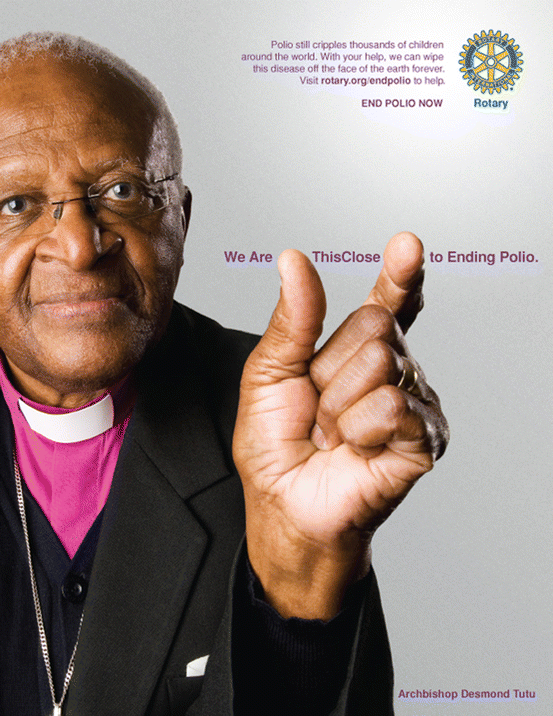Fig. 10.1
KPOA logo
As part of this initiative, and to coincide with the FIFA World Cup Soccer Tournament which was held in South Africa in 2010, Rotary International, through its Africa network of Clubs and Districts, launched a 4-month pan-African public awareness campaign to build support for the final push to Kick Polio out of the continent. The campaign focused on mobilizing parents to help with massive anti-polio drives in the Spring of 2010 which targeted over 100 million African children mainly under 5 years.
At the heart of the campaign was a signed football which would traverse all the main countries in Africa affected by polio to highlight the programme and in turn gather the names of distinguished African personalities who were happy to identify themselves with the initiative.
Aims of the Project
The objective of the KPOA campaign was to contribute to Rotary’s Global End Polio Now campaign by raising awareness and support for Rotary’s polio eradication efforts. The campaign approach was twofold, to not only raise awareness in donor countries but also to mobilize communities in polio-affected countries. In particular it was designed to:
Raise global awareness of the potential, the need and benefit of eradicating polio.
Help mobilize parents of over 100 million children under the age of five for mass immunizations throughout Africa.
Build momentum in the lead-up to the World Cup with football-related awareness events to mobilize the public.
Motivate African Rotary members to hold local events to ensure parents vaccinate their children.
Inform the public about what Rotary is and the work it is doing in the community.
How the Project Was Set Up
This was one of the most ambitious campaigns of its kind ever to be launched by Rotary International in support of a specific programme. It was both tactically and physically an organizer’s nightmare! How does one send a soccer ball through 23 polio-affected countries in Africa in 4 months—with a maximum of 4 days between each stop? This was achieved thanks to the help, passion, and commitment of reputable freight company DHL Express, who provided their services free of charge.
Rotary International’s infrastructure of National PolioPlus Committee Chairs throughout Africa, working in collaboration with their Reach Out to Africa Committee, Public Image and Rotary District leadership in 14 districts in Africa helped to coordinate mega community events, where government and health officials would publicly endorse their commitment to the campaign and sign the ball.
The media campaign was handled on three fronts, namely: national organizers in all 23 countries through which the ball was to be shipped; a main coordinator in Cape Town who masterminded the whole campaign; and a team from Rotary International at its headquarters in Evanston, USA who provided logistical support and media outreach throughout the campaign and in follow-up programmes.
Delivery of the Project
The campaign was launched in Cape Town on February 23, Rotary’s birthday, at the prestigious V&A Waterfront complex with the symbolic kicking of a ball by a South African football personality—Hans Vonk—and signed by former Archbishop Desmond Tutu, who himself had been a polio victim as a child. Although he was keen to take an active part in the campaign, his own health did not allow him to do so but he was warmly welcomed as the campaign’s Goodwill Ambassador. The old Port Captain’s building, an historic building at the harbor, was suitably lit up for the occasion with the Rotary theme “Kick Polio out of Africa” in lights and Table Mountain itself was lit up for the occasion. Elsewhere in Africa, almost at the same time, the Pyramid of Khafre, the second largest of the ancient Egyptian pyramids of Giza, was also similarly illuminated. Throughout the world, other prominent landmarks including Britain’s Houses of Parliament, the Sydney Harbour Bridge and Niagara Falls were also lit up.
From the initial launch in Cape Town, the ball then travelled extensively throughout Africa and finally exited through Alexandria, in Egypt on 12 June 2010 with a special event at the Bibliotheca Alexandria. As with the initial launch in Cape Town, the football was literally “kicked-out,” this time towards the Mediterranean Sea by Egyptian national team captain Eslam El Shatter. A press conference and ceremony was held which also featured representatives of the Minister of Health, diplomats, dignitaries, and campaign supporters, including Egyptian film star, Hani Salama. The ball was then air-freighted by DHL, who also took responsibility for delivery within Africa, to the Rotary International Convention which was being held in Montreal, Canada at the time; here it was presented to the Rotary International President and was warmly welcomed by the 25,000 assembled delegates at the Convention.1
In addition to the extensive media coverage received throughout the continent, a KPOA blog monitoring the progress of the ball was launched and the virtual ball site (www.kickpoliooutofafrica.org) allowed thousands of people to show their support for the push to end polio once and for all. The blog featured the ball’s epic journey from country-to-country with detailed information, photos, and videos.2 The virtual ball site also capitalized on the tremendous global enthusiasm for football preceding the World Cup, particularly in countries with national teams competing in the tournament.
Press releases and social media releases were distributed to media throughout the campaign. The campaign also used paid placements to raise awareness, including ads and public service announcements featuring African celebrities, including artists and notable figures, such as: Desmond Tutu (Fig. 10.2); Nigeria’s soccer captain Nwankwo Kanu (Fig. 10.3); Congolese band Staff Benda Bilili; Beninoise singer Zeynab Abib; and Nigerian folk musician Dan Maraya Jos.






